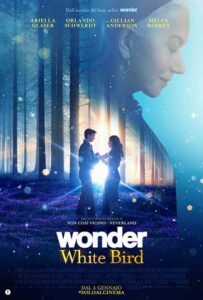
White Bird
1942. Sara is fifteen years old and lives in Alsace, that is, in unoccupied France. However, the German presence gradually becomes stronger and the raids begin. She will be saved by the family of Julien, a boy suffering from polio, whom she previously kept at a distance. A strong friendship is born between the two which will develop over the long period in which she will have to remain hidden.
A film which, by remaining too faithful to the novel, ends up losing a message that remains important.
Marc Forster, taking note of the success of Wonder by Stephen Chbosky, thought he could exploit the box office success of that film to launch his new effort. It’s a shame, however, that the connection to the film with Julia Roberts and Owen Wilson seems decidedly specious.
It’s not enough to have the bully in that film expelled from school at the beginning to justify the postponement and make grandmother Helen Mirren’s story about her past as a persecuted young Jew plausible. The tenuous link is given by the fact that R.J. Palacio, the author of the novel on which Wonder was based, is also the author of the graphic novel that served as the basis for this film.
However, here lies the problem because not everything that appears on the pages of a book can be transferred to the screen. Forster, who directed films like Return to the Hundred Acre Wood or, even better, The Kite Runner should know this. His gaze from the States allows him, this is an advantage, to look without discount at the collaboration of some of the French with the occupying Nazi forces. He does not spare even the youngest, making one of them an even more ferocious persecutor than the Nazis themselves.
However, what ends up invalidating the always necessary denunciation and memory of what happened in those years is the insertion of elements that end up establishing themselves as fable-like or, in any case, unbalanced with respect to the dramatic context.








